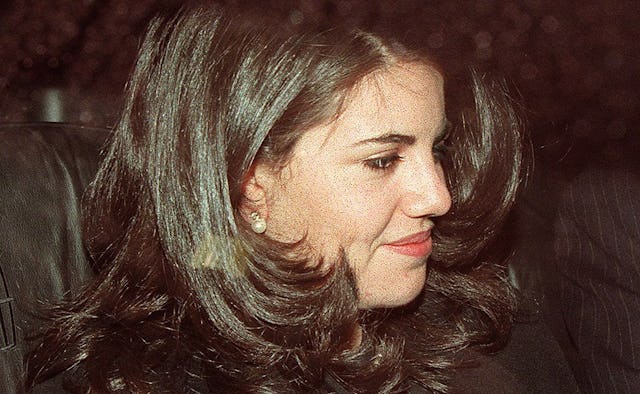I Hated Being Mistaken for Monica Lewinsky, But Not for Why You Think

“Blow me, Monica.”
That’s what a homeless man yelled to me on a New York City street during the winter of 1998. This was just the most crude in a string of Monica Lewinsky-themed epithets I heard that year.
As a woman in my twenties with longish layered black hair, pale skin and dark lipstick, I spent much of 1998 being mistaken for Monica Lewinsky. I was approached by strangers in supermarkets and bars telling me I looked like her. Two women followed me around a bookstore, ducking behind shelves. When I asked if I could help them, they explained, noses wrinkled: “We thought you were that Lewinsky girl.”
© Melissa Kirsch
My feelings today about what happened to Monica Lewinsky—my sympathy at how her life was unfairly destroyed by the media, my anger at how Bill Clinton skated off unscathed while she was reduced to a punchline—were quite different in the late ’90s. At 24, insecure and trying to forge my post-college identity and told I looked like Monica at every turn, I was concerned with how she looked. A “portly pepperpot” sniped the New York Post. “The girl who was too tubby to be in the high school ‘in’ crowd,” wrote Maureen Dowd. I didn’t think critically of how she was portrayed. I took each insult to her appearance personally. I didn’t want to look like Monica Lewinsky—not because she was infamous, but because people said she was fat.
Seventeen years from the week that news of the relationship broke, I look at Monica, and I look at myself at her age. We were both attractive young women. I was leading a mostly anonymous life as a writer, one of trillions in a faceless city, while she was on the cover of every newspaper, pilloried at every turn. I like to think if the Clinton scandal occurred now, I would feel differently being compared to Monica Lewinsky. I would be one of the people staunchly defending her on social media, who would be looking more critically at the president and his cronies and the power they wielded. I would look at Monica as a confederate, a woman with a body that the world felt free to scrutinize, to criticize, to use against her. I wish I’d had the perspective to look at her that way when I was 24.
Then, when people mistook me for Monica Lewinsky, I felt deeply insulted. If someone told me I looked like Monica Lewinsky today, I’d be proud.
This article was originally published on